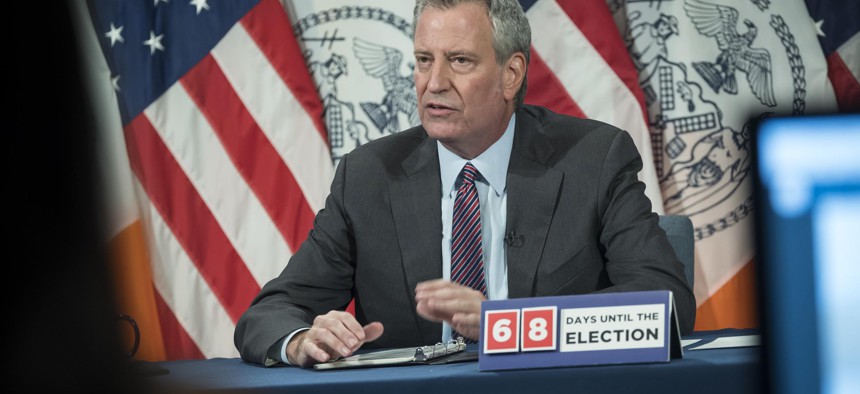Community organizations join calls in support of expanding NYC’s borrowing authority

New York City Mayor Bill de Blasio at press conference. Ed Reed / Mayoral Photography Office
In a letter sent to state legislative leaders and Gov. Andrew Cuomo on Tuesday, more than 100 community-based organizations called on New York state to approve New York City’s request to borrow up to $5 billion to cover its revenue shortfall.
“With borrowing authority, we can stave off the worst and save the character of our city,” the letter states. “Further cuts will likely hit us hardest, even though we provide crucial services to vulnerable New Yorkers.”
As New York City faces a $9 billion budget deficit with no immediate hope that federal aid will come in the near future, Mayor Bill de Blasio has asked the state legislature to allow it to borrow billions of dollars to contend with the fiscal crisis. Without it, the mayor has said as many as 22,000 city employees may need to be laid off to fill in the budget gap.
Some fiscal watchdogs, such as the Citizens Budget Commission, have opposed borrowing, saying that it will likely burden the city with debt in the future. Leaders at nonprofits that signed on in support of the measure said that the immediate influx of funding will be necessary, however, to help the city’s most vulnerable residents.
“As an organization that serves a vulnerable population, when cuts happen normally, they happen to our community and our population,” said Sean Coleman, executive director of Destination Tomorrow, a nonprofit that serves LGBT people in the Bronx. “So it’s imperative that we at least have our voice heard as to how detrimental that will be if the city cuts the vital programs we provide.” Cuts to the city’s discretionary funding programs have already slashed 15% of his organization’s initiatives, which include offering meals and counseling.
Jo-Ann Yoo, executive director of the Asian American Federation, said her support for the measure came with the caveat that, if the funding comes in, the city should use it in a way that prioritizes the needs of communities of color and the organizations that serve them.
“Our nonprofits are the ones who kept our communities alive during the pandemic,” she said.